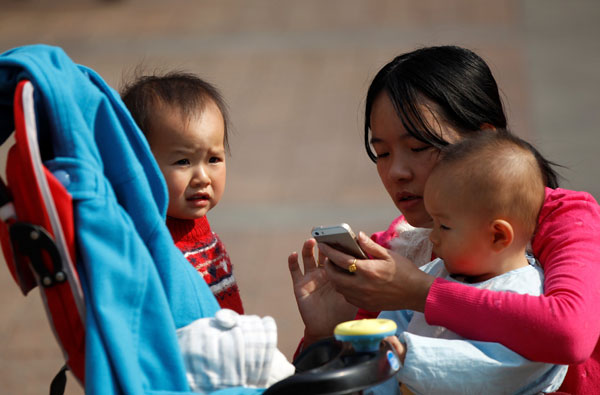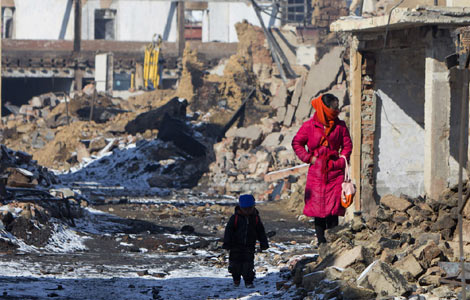Looming baby boom no sweat: officials
Updated: 2014-01-18 01:07
By Qiu Quanlin in Guangzhou (China Daily)
|
||||||||
|
 |
|
The baby boom that will likely occur in Guangdong after the province relaxes the one-child policy will not put added stress on public services, Guangdong officials said on Friday. Zou Zhongpin / For China Daily |
A slight baby boom that results from the new policy to let qualified families have a second child won't pose a big challenge to public services such as education, healthcare or employment, a top health and family planning official from Guangdong province said on Friday.
"Guangdong foresees a baby boom in the next two years if the province's application to allow qualified couples to have two children is approved by the central government," Chen Yuansheng, director of Guangdong Provincial Health and Family Planning Commission, told a news conference on the sidelines of the province's annual legislative meeting.
Guangdong, which has surpassed Henan and Shandong provinces to become the nation's most populous province, will have 135 million residents by 2015, sources with the local family planning commission said.
Chinese parents will be allowed to have two children if one of them is an only child, according to a recent decision at the Third Plenary Session of the 18th Central Committee of the Communist Party of China.
Prior to the amendment, couples could have two children only if both parents were the only child in their families.
"Most qualified couples in Guangdong are willing to have a second child," Chen said.
But the expected baby boom will not put pressure on public services as the additional children should account for only a small percentage of the province's total population, Chen said.
"Public services, including healthcare and education, will not be largely affected, given that Guangdong already is the most populous province in the country," Chen said.
Zhang Feng, former director of the Guangdong population and family planning commission, said 1.1 million to 1.2 million babies are now born in the province each year.
"If qualified couples are allowed to have a second child, Guangdong will see about 130,000 more babies each year. The baby boom will bring little social impact," Zhang told China Daily.
Zhang would like the family planning policy to be even more relaxed, given a survey that found more than 80 percent of Guangdong couples are willing to have a second child.
"People in Guangdong believe that having more children means more blessings. I hope all couples in the province are allowed to have a second child as there will be little pressure resulting from the babies' births on social services," Zhang said.
China's longtime one-child policy was introduced in the late 1970s to rein in population growth. It limited most urban couples to one child and most rural couples to two children if the first child was a girl.
After the central government's policy was established recently to allow qualified families to have a second child, provinces and regions have applied to the central government to request early implementation.
Liu Zhi, director of Beijing Municipal Commission of Population and Family Planning, said the city's revised regulations on family planning are set to take effect on March 1.
However, the revised version will probably retain the constraint that the couple's first child should be at least 4 years old or the wife should be at least 28 years old before they can have a second one, Liu said.
"We estimate there will be 30,000 to 50,000 additional babies born per year (after the new policy goes into effect). Currently, about 210,000 babies are born and 140,000 to 150,000 people die each year in Beijing," he said.
Officials from Zhejiang province said on Friday that the Standing Committee of Zhejiang Provincial People's Congress had approved its amendment to local family planning regulations, making it the first Chinese province to ease the country's decades-long family planning policy.
Yin Wenyao, a professor at Zhejiang University, attributed the early implementation of the policy to the province's low fertility rate.
"Demographically speaking, a fertility rate of 2.1 is considered as sustainable. China's total fertility rate dropped from 5.8 in 1970 to 1.5 in 2012. The figure in Zhejiang, however, is only about 1.2," he said.
Yin said if the province keeps the low fertility rate, people over the age of 60 will account for 32 percent of the province's total population by 2030, 8 percentage points higher than the national average.
"There will not be a baby boom starting from this year. Couples are now more rational about having children. The pressures that include high housing costs and climbing consumer expenses will keep many from having a second child," he said.
Zhang Tiantian, a 31-year-old public servant from Hangzhou, said she is not interested in having another child.
"I want my daughter to have the best I can offer. I'm not sure I have enough money, time and energy for two children," she said.
The Women's Hospital of Zhejiang University's School of Medicine will open a new branch by the end of the year that promises to be five times larger than the existing one. Hangzhou Women's Hospital, with more than 600 beds, will be open by 2015.
Yan Yiqi in Hangzhou and Wang Qingyun in Beijing contributed to this story.

 Wildfire out of control in Los Angeles, US
Wildfire out of control in Los Angeles, US
 Bull-taming festival kicks off in India
Bull-taming festival kicks off in India
 Way to art school
Way to art school
 'American Hustle,' 'Gravity' lead Oscar nominations
'American Hustle,' 'Gravity' lead Oscar nominations
 138th Westminster Kennel Club Dog Show to open
138th Westminster Kennel Club Dog Show to open
 Volcano displaces thousands in Indonesia
Volcano displaces thousands in Indonesia
 China issues fog alerts
China issues fog alerts
 Stray cats on the way to be slaughtered saved
Stray cats on the way to be slaughtered saved
Most Viewed
Editor's Picks

|

|

|

|

|

|
Today's Top News
US Treasury chief says high-level engagement 'welcomed'
Dirty air? Why not wash it?
He Xiaohui: A visionary rooted inservice
Auto-glass maker invests $200 million for US plant
Consul General lauds progress in 2013
Teaching English in China a good Plan B
China's US debt holdings reach record high
Asiana firefighters saw victim alive
US Weekly

|

|






